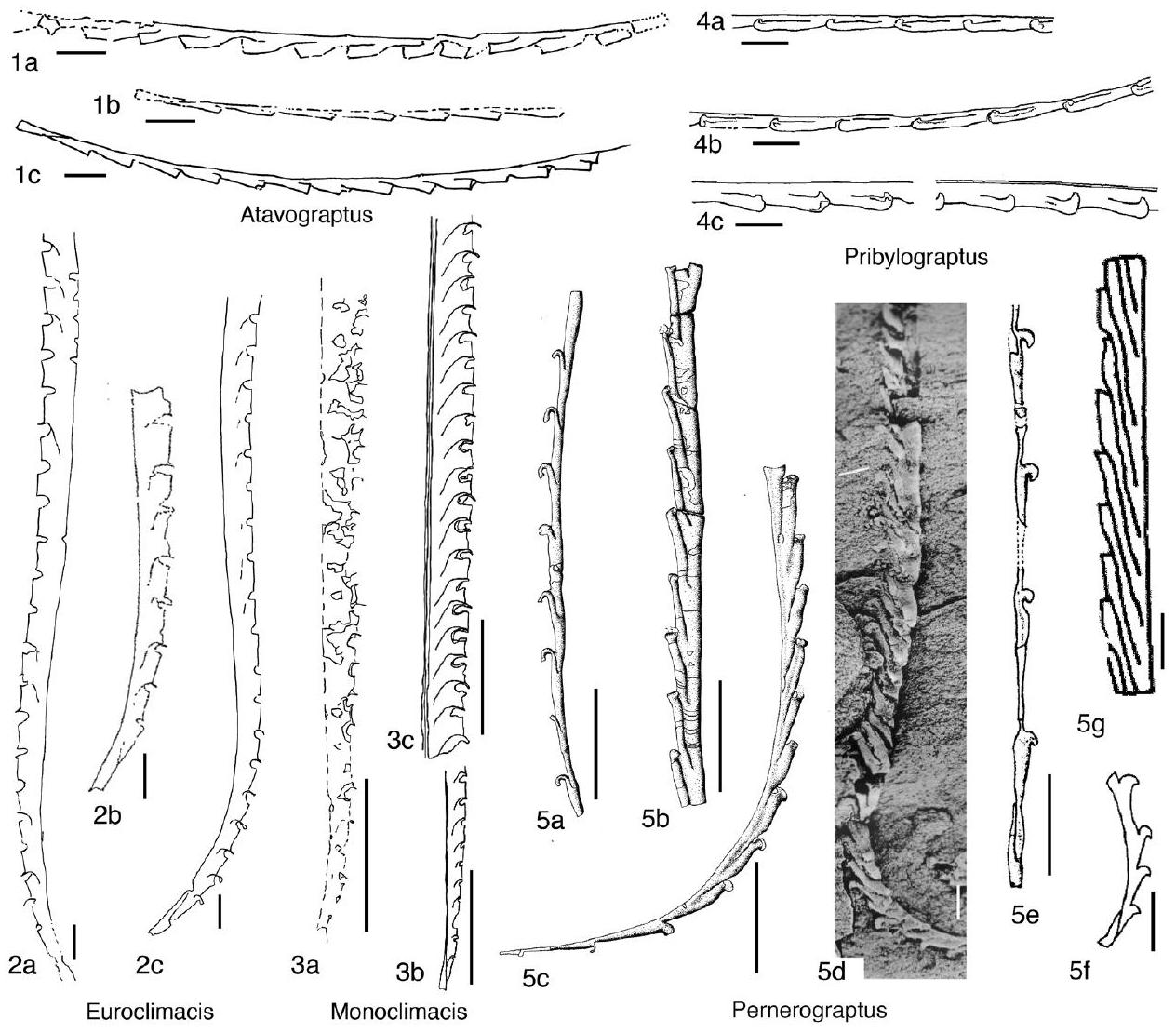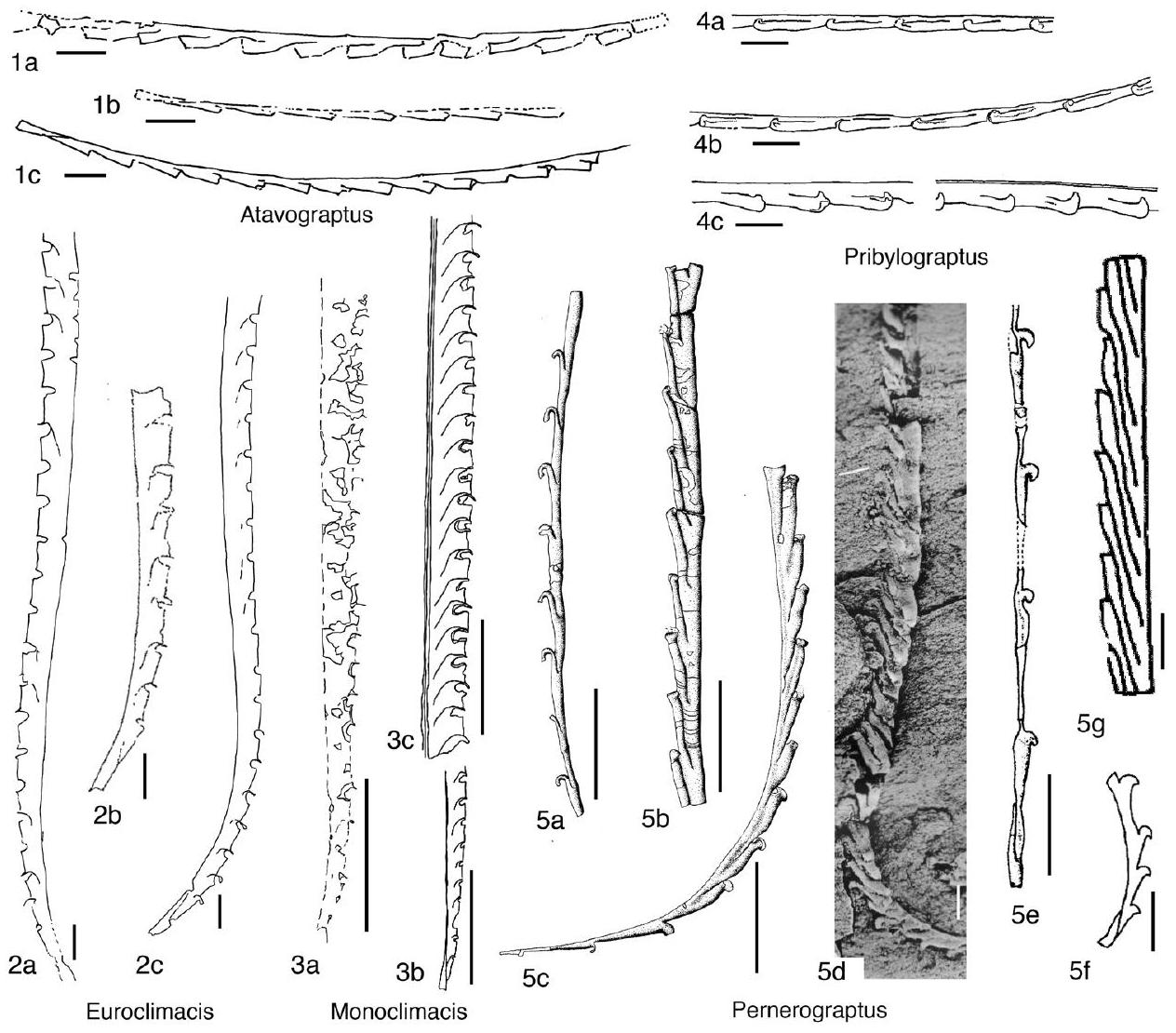Welcome to the Treatise on Invertebrate Paleontology!
Please enter a genera name to retrieve more information.

Pernerograptus
Classification
Phylum:
Hemichordata
Class:
Pterobranchia
Subclass:
Graptolithina
Order:
Graptoloidea
Suborder:
Axonophora
Infraorder:
Neograptina
Superfamily:
Monograptoidea
Family:
Monograptidae
Subfamily:
Pernerograptinae - Subset of genera with short sicular
Formal Genus Name and Reference:
Pernerograptus Pर̌IBYL, 1941, p. 9
Type Species:
*Graptolites argenteus NICHOLSON, 1869, p. 239, OD
Images
(Click to enlarge in a new window)
Fig. 293,5a-b. P. revolutus (Kurck), syntype, LO 475t, Bollerup, Scania, Sweden, scale bars, 1 mm (Hutt, 1974b, fig. 1a-b), ——Fig. 293,5c. P. sudburiae (Hutt, 1974b), holotype, LO 4454T, Tommarp, Sweden, scale bar, 1 mm (Hutt, 1974b, fig. 1d), ——Fig. 293,5 d-e. *P. argenteus (Nicholson), 5d, lectotype, NHMUK Q3148, Skelgill, Lake District, England (Hutt, 1975, pl. 17,3), 5e, proximal end with sicula, SM A85016, Yewdale Beck, England (Hutt, 1975, fig. 17,2). Scale bars, 1 mm, ——Fig. 293,5f-g. P. leptotheca (Zнао, 1984), proximal and distal fragments (Zhao, 1984, fig. 4A,C). Scale bars, 1 mm
Synonyms
Pernerograptus, Quasipernerograptus, Pseudopernerograptus
Geographic Distribution
worldwide
Age Range
Beginning Stage in Treatise Usage:
Silurian (Llandovery (Rhuddanian, Pernerograptus revolutus/Coronograptus cyphus Biozone))
Beginning International Stage:
Rhuddanian
Fraction Up In Beginning Stage:
0
Beginning Date:
443.07
Ending Stage in Treatise Usage:
Silurian (Llandovery (Aeronian, Lituigraptus convolutus Biozone))
Ending International Stage:
Aeronian
Fraction Up In Ending Stage:
100
Ending Date:
438.59
Description
Straight to dorsally curved proximal part of tubarium with straight distal part, dorsal curvature accentuated in mesial part of colony, biform thecae, sicula small, apex not reaching to first metatheca, proximal thecae slender, axially elongated without overlap, terminated by apertural hoods that are either simple or transversely expanded, apertural hoods retreat in mesial thecae leaving only lateral lappets and dorsal apertural hoods that also subsequently retreat, resulting in simple, cylindrical, greatly overlapping distal thecae
References
Museum or Author Information
Classification
Phylum:
Hemichordata
Class:
Pterobranchia
Subclass:
Graptolithina
Order:
Graptoloidea
Suborder:
Axonophora
Infraorder:
Neograptina
Superfamily:
Monograptoidea
Family:
Monograptidae
Subfamily:
Pernerograptinae - Subset of genera with short sicular
Formal Genus Name and Reference:
Pernerograptus Pर̌IBYL, 1941, p. 9
Type Species:
*Graptolites argenteus NICHOLSON, 1869, p. 239, OD
Images
(Click to enlarge in a new window)
Fig. 293,5a-b. P. revolutus (Kurck), syntype, LO 475t, Bollerup, Scania, Sweden, scale bars, 1 mm (Hutt, 1974b, fig. 1a-b), ——Fig. 293,5c. P. sudburiae (Hutt, 1974b), holotype, LO 4454T, Tommarp, Sweden, scale bar, 1 mm (Hutt, 1974b, fig. 1d), ——Fig. 293,5 d-e. *P. argenteus (Nicholson), 5d, lectotype, NHMUK Q3148, Skelgill, Lake District, England (Hutt, 1975, pl. 17,3), 5e, proximal end with sicula, SM A85016, Yewdale Beck, England (Hutt, 1975, fig. 17,2). Scale bars, 1 mm, ——Fig. 293,5f-g. P. leptotheca (Zнао, 1984), proximal and distal fragments (Zhao, 1984, fig. 4A,C). Scale bars, 1 mm
Synonyms
Pernerograptus, Quasipernerograptus, Pseudopernerograptus
Geographic Distribution
worldwide
Age Range
Beginning Stage in Treatise Usage:
Silurian (Llandovery (Rhuddanian, Pernerograptus revolutus/Coronograptus cyphus Biozone))
Beginning International Stage:
Rhuddanian
Fraction Up In Beginning Stage:
0
Beginning Date:
443.07
Ending Stage in Treatise Usage:
Silurian (Llandovery (Aeronian, Lituigraptus convolutus Biozone))
Ending International Stage:
Aeronian
Fraction Up In Ending Stage:
100
Ending Date:
438.59
Description
Straight to dorsally curved proximal part of tubarium with straight distal part, dorsal curvature accentuated in mesial part of colony, biform thecae, sicula small, apex not reaching to first metatheca, proximal thecae slender, axially elongated without overlap, terminated by apertural hoods that are either simple or transversely expanded, apertural hoods retreat in mesial thecae leaving only lateral lappets and dorsal apertural hoods that also subsequently retreat, resulting in simple, cylindrical, greatly overlapping distal thecae

